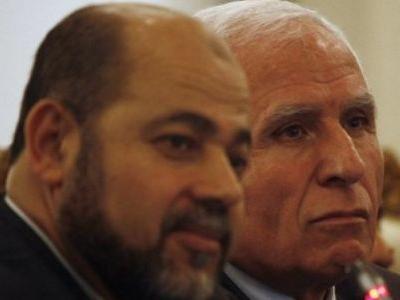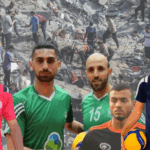Hamas at 24: Politics of Resistance in Changing Middle East

Hamas' conundrum may prove too difficult to solve. (Aljazeera)
By Ramzy Baroud
Ever since Hamas emerged victorious in the 2006 Palestinian legislative elections, myriad public opinion polls revealed that its popularity in the Occupied Territories was on a steady decline.
However, there are actually few indications that Hamas as a popular movement will be departing the Palestinian political landscape anytime soon. Ongoing talks in Cairo between Hamas and Fatah officials, sometimes involving the Palestinian National Authority President Mahmoud Abbas himself, indicate that Hamas’ imprint is likely to be felt in political institutions like the Palestine Liberation Organization (PLO) in the near future.
In the few weeks following the latest round of unity talks between Abbas and Hamas’ leader, Khalid Mesha’al, in Cairo, Hamas has outdone itself in commemorating its anniversary. The Gaza rally on December 14 was a stage for Hamas leaders to recount the achievements of their movement over the course of 24 years, including the number of rockets fired at Israel since 2000 (the year the Second Uprising began) in retaliation for the numerous Israeli attacks and incursions. Such recounting was meant to assert that the armed wing of Hamas — a small force armed with homemade rockets and smuggled light weapons — was a strong contender to the Israeli army.
But what Hamas truly represented to the estimated 350,000 Gazans at the rally was not any illusion that the movement could single-handedly defeat the Israeli army. What Hamas has offered since its inception in December 1987 is the idea that resistance is actually still an option.
“We affirm that armed resistance is our strategic option and the only way to liberate our land, from the sea to the river,” said Esmail Haniyeh, Hamas’ Prime Minister. “God willing, Hamas will lead the people … to the uprising until we liberate Palestine, all of Palestine.” Haniyeh also asserted that Hamas “will not recognize Israel” (AP, December 14).
The mere listing of these objectives is meant to delineate that the movement’s program remains true to the original goals it declared 24 years ago. Since then, Hamas has morphed in both popularity and political import. It has proven itself to be resourceful and resilient against all sorts of pressures, including the Israeli assassinations of several top tiers of its founders and political and military leaders.
The recent prisoner swap, which saw the freedom of 1,027 Palestinian prisoners in exchange for one Israeli soldier, is a testimony to Hamas’ ability to claim hard-earned achievements in the most difficult of circumstances.
However, the movement, which managed to survive successive Israeli wars and an economic siege, is facing one of its greatest challenges yet: unity talks with Fatah, which has always dominated the PLO. It is a great challenge because the Fatah leadership has yet to truly depart from an old political mindset keen on repeating political mistakes predicated on political exclusivity and domination over other PLO factions, favoritism, and the ability to co-exist with the Israeli occupation.
Hamas is, of course, guilty of some of Fatah’s mistakes. However, it also managed to successfully present itself as the bulwark of mouqawama (resistance) in the imagination of a large segment of the Palestinian population.
Since 2006, Hamas has also been attempting to learn the tricks of international politics, while maintaining its emphasis of armed resistance. Hamas’ political outreach has been neither a resounding success, nor a total failure.
Meanwhile, Israel’s attempt to destroy Hamas in its Cast Lead war of 2008-09 was an astounding military disaster. Military power obviously has its limits, and eradicating popular movements using illegal white phosphorous against civilians is just a bad idea (not to mention a war crime by any serious reading of international law).
Israel is unlikely to learn from its grievous military adventures, but Hamas continues to learn from adversity. It is finding ways to circumvent the Israeli siege, and to channel money from various Arab countries to rebuild Gaza.
But how long can Hamas remain committed to armed resistance, maintain an unofficial ceasefire with Israel, respond to Israeli incursions and airstrikes, carry on with unity talks and reconciliation with Fatah, rebuild Gaza under siege and break out from its political seclusion, while also remaining committed to its old charter?
There are ample readings of Hamas’ position in the currently changing political landscape of the Middle East. Some commentators argue that the movement is suffering a political crisis due to the uprising and civil war under way in Syria. Others have predicted Hamas’ regional ascendency based on the current political reshuffling in Egypt and the rise of the Muslim Brotherhood.
Either way, Hamas will most likely find ways to adjust and survive — if not thrive — under any possible scenario. The challenge, however, is maintaining a balance that would allow Hamas’ incorporation into the PLO – which could facilitate the end of its political isolation and permit its leaders to appeal to millions of Palestinians as the vanguard of Palestinian resistance.
The difficulties in maintaining both positions are already becoming clear. Mesha’al told AFP recently that “every people has the right to fight against occupation in every way, with weapons or otherwise. But at the moment, we want to cooperate with the popular resistance … We believe in armed resistance but popular resistance is a program which is common to all the factions” (Time online, November 27). This logic alone is a considerable shift from Hamas’ old resistance manual, and is not exactly consistent with Haniyeh’s recent speech in Gaza.
Will Hamas manage to keep one foot in the Abbas camp, and another in its old resistance-based political program? Even for a robust and resourceful movement like Hamas, such a conundrum may prove too difficult to solve.
– Ramzy Baroud – www.ramzybaroud.net – is an internationally-syndicated columnist and the editor of PalestineChronicle.com. His latest book is My Father Was a Freedom Fighter: Gaza’s Untold Story. (This article was originally published in Gulf News – gulfnews.com)










































0 Comments